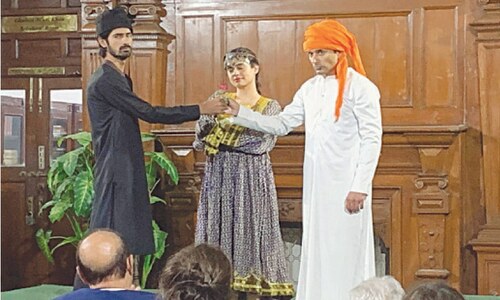During the early 1990’s, local publishing houses and newspapers of Lahore switched over to computer composing, apparently marking the end of centuries-old tradition of ‘kitabat’. The calligraphers rendered jobless by the development were in a state of despair, seeing no future for their skill. The calligraphy was mocked as a ‘meager craft’ by the vocal pundits of Western Art.
In 1997, Athar Tahir, a civil servant with passion for art and literature, formed Pakistan Calligraph-artists Guild with the help of some senior calligraphers and other like-minded people determined to revive this vanishing art.
“1997 was the Golden Jubilee year of Pakistan. I was the commissioner of Lahore and the project of Data Darbar Mosque construction was handed over to me.
“The previously proposed architectural design inspired by the architecture of Ottoman Empire was simplified to bring it in harmony with the spirit of the mystic Sufi. In the new design, there was a lot of calligraphic work to do.
“When I started looking for calligraphers, it was really hard to find any in the market. On inquiry, I came to know that most of them were confined to their houses with a general feeling of being left out,” Athar Tahir recalls.
“I engaged master calligraphers like Sufi Khursheed-raqam, Gohar Qalam, Irfan Khan and Ikram-ul-Haque, along with a good number of junior artists (for the project). After the job was done, they refused to accept the payment. Initially, I thought the amount might be less than what they were expecting. To my surprise, they said they didn’t want any financial reward for their services because they had done the work considering it as a religious duty.
“Most of them were jobless, facing financial hardships, and money offered to them (Rs2400,000) was good enough to meet their immediate needs.
“I was really moved by this gesture and decided to make an organisation to benefit them and revive the dying art and craft,” he relates.
“Before setting up the organisation, the first step was to establish the ‘Calligraph-art’ as a different genre from the traditional calligraphy. It allows artists to deviate from the strict rules of traditional calligraphy and create visuals from imaginations of their own. My writings to elaborate the concept were well received and served as an intellectual narrative for the formation of Guild,” he explains.
“Askari Mian Irani, Ismail Gulgee, Hanif Ramay and Ahmed Khan used to be the friends of the Guild. These inspiring figures helped a great deal to groom young aspirants and practicing traditional calligraphers,” he acknowledges.
After Data Darbar Mosque, the calligraphic works rendered voluntarily by members of the Guild at the shrine of famous Punjabi poet, Qadir Yar, in the suburbs of Gujranwala, is another historic work to their credit.
For more than a decade, the Guild members have been holding calligraphy classes at the Alhamra Cultural Complex, Lahore, for the students of various age groups. The development of books to learn calligraphy, printed by the Punjab Textbook Board played a major role in helping the young students to get familiar with the fundamentals of the art.
Holding workshops at various educational institutions, running monthly publications and expanding the organisation to various small towns of Pakistan have helped revive the traditional skill.
The calligraphy is now being taught as a regular subject in the prime art institutions of Lahore and young calligraphers are having their share in the art market as well.
The annual exhibitions and the shows of the works by international artists of Italian, Arab, Central Asian, Chinese and Iranian origin have inspired a lot of local artists.
“This interaction has influenced the both sides. Italian artist Massimo Polello keenly studied the works of Askari Mian Irani during a visit to my house. After a few years, I was amused to see influence of the Pakistani master on the works of contemporary Italian legend,” he concludes proudly.
Published in Dawn, November 27th , 2014













































Dear visitor, the comments section is undergoing an overhaul and will return soon.